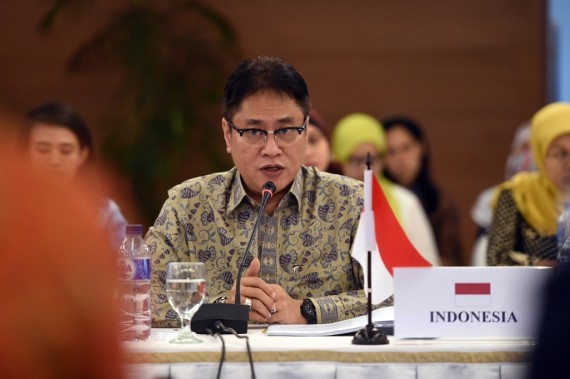Popular Reads
Top Results
Can't find what you're looking for?
View all search resultsPopular Reads
Top Results
Can't find what you're looking for?
View all search resultsASEAN to sign COVID-19 recovery framework, RCEP
Change text size
Gift Premium Articles
to Anyone
A
SEAN states are expected to sign a landmark multilateral trade deal together with their regional partners at the upcoming ASEAN Summit next week, where their leaders are to also launch various COVID-19-related initiatives, including a comprehensive recovery framework and regional travel corridor arrangement, officials have said.
Preparations for the upcoming summit were underway as ASEAN chair Vietnam looked to host the event again via video conference from Nov. 12 to 13 amid the pandemic, said Vu Ho, director for the Vietnamese Foreign Ministry’s ASEAN department.
Having served most of its time leading the regional bloc through online meetings this year, the official said that the pandemic had greatly affected how ASEAN’s thousands of annual meetings were conducted.
“For the last year, we [have been] trying our best collectively on all fronts; on the one hand, to push forward ASEAN community-building forward, while on the other, to fight COVID-19,” he said during a webinar hosted by the Economic Research Institute for ASEAN and East Asia (ERIA) on Thursday.
Despite the hurdles, Vu Ho said member states agreed to launch initiatives such as the COVID-19 ASEAN Response Fund, proposed by Vietnam and Thailand, with contributions reaching US$10 million.
Other efforts to be announced included a medical supplies reserve for the region, standard procedures for responding to future disease outbreaks and a comprehensive ASEAN recovery framework together with its implementation plan.
ASEAN also agreed to set up a center for public health emergencies and emerging diseases, with funding from the Japanese government amounting to $50 million.
Member states have yet to agree on where the center would be situated.
Another proposal that was currently being prepared ahead of the summit was the ASEAN travel corridor arrangement (TCA), the Vietnamese official said.
“We are very much looking forward to having a leaders' statement on this initiative next week,” he said.
ASEAN Secretary-General Lim Jock Hoi said the discussion on the travel corridor arrangement was still underway but there was hope that ASEAN would be able to issue a declaration and an accompanying action plan, especially for essential sectors.
“I know that on a bilateral basis a lot of our member states have already made arrangements, but it is very important that we have a coordinated regional ASEAN travel corridor,” he said at the ERIA webinar on Thursday.
ASEAN’s member states have dealt with the pandemic in significantly different ways and with distinct approaches, with some doing better than others. But the region as a collective whole has quietly put together robust mechanisms to ensure that the fight against COVID-19 can be overcome.
Despite the attention that the regional organization has placed on the COVID-19 response, observers are keen to learn about the conclusion of the long-awaited Regional Comprehensive Economic Partnership (RCEP) agreement.
“At this very particular moment, I can only inform [you] that the RCEP negotiation is 90 percent done, and that for the signature, we have to discuss how to sign it online [as well as other ways to deal with] the legal issues,” Vu Ho said.
The RCEP comprises ASEAN’s 10 members as well as regional partners China, Japan, South Korea, Australia, New Zealand and India, although India pulled out over differences in the scope of trade tariffs.
Measured by population and economic size, it is set to be the largest regional trade bloc in the world, accounting for about a third of global gross domestic product.
As ASEAN’s largest economy, Indonesia already has significant trade flows to and from RCEP countries, justifying the need for the regional trade agreement.
Around 61.65 percent of its total exports last year – around $95 billion – were channeled to RCEP countries, according to data from Statistics Indonesia (BPS).
RCEP countries also accounted for $106 billion (71.38 percent) of Indonesia’s total imports last year. Since 2012, Indonesia has booked trade deficits with RCEP countries.
Negotiators had been meeting intensively for the past few weeks to resolve the remaining details in the trade deal, said Iman Pambagyo, the Indonesian Trade Ministry’s director general for international trade negotiations.
He also said they were discussing how to sign the agreement virtually under the coordination of the ASEAN Secretariat and Vietnam’s Foreign Ministry.
“I am sure there is a way it can be done. It has happened – even though it is not multilateral in nature – but there have been several agreements signed virtually,” he told reporters in a separate briefing on Friday.
“I am sure it will happen very soon.”
The concept of the RCEP was first proposed during Indonesia’s chairmanship of ASEAN in 2011. Throughout that year, Indonesia was hard-selling the concept to fellow ASEAN member states, which led to them collectively approach the six dialogue partners with existing trade agreements the following year. Since then, Indonesia has been responsible for leading the ASEAN bloc in talks.
“It's been eight years,” Iman said. “I hope we reach the finish line, but we are still working on this together. I am quite optimistic, or perhaps, cautiously optimistic.”










